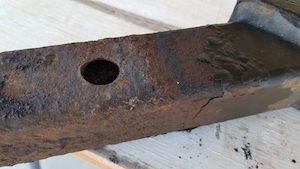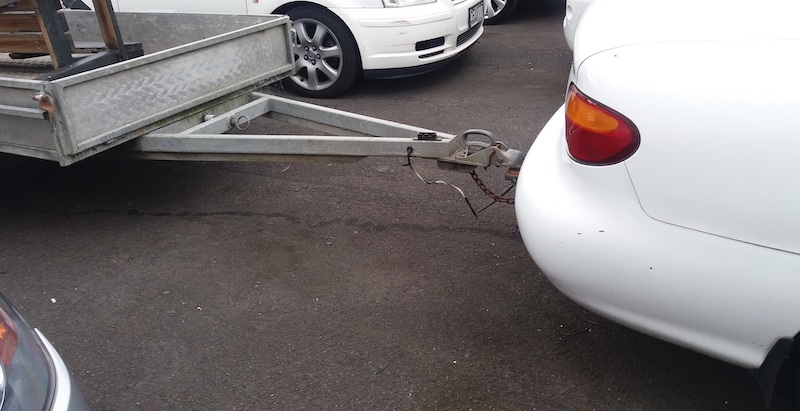When it comes time for your Warrant of Fitness (WOF) inspection, every part of your car will be checked to ensure good working condition. From the brakes to the engine to the seatbelts, the WOF covers it all (see a full WOF inspection checklist here). One thing that will be checked that may not come to mind is the car’s towbar, but in fact, if the towbar has suffered severe rust damage it may cause a failed WOF.
Generally this rust can be professionally cleaned off, treated and painted to prevent future rust. This will then allow you to pass your WOF recheck.
What is checked during WOF for towbars?

Part of a rusty towbar.
When getting your towbar inspected, both the towbar and the towbar coupling (towball) will be checked (see the list of WOF towbar requirements here).
Towbar – You can probably guess from the name that the tow bar is an extended piece of metal you can attach to your car, ute or van in order to be able to tow with your vehicle. Most commonly, they are used to tow trailers and caravans. The type of towbar your car has is dependent on the make and model and the weight / load rating you are looking to tow. Different cars require different towbars because they attach to the floor pan / chassis, or the underbody of the car, which is not the same for every vehicle. Therefore, towbars must be pre made to fit your vehicle.
Towbar coupling (towball) – The towbar coupling and towball are components of the hitch, or in other words, where the towbar connects the object it is carrying. The towball connects to the towbar coupling. Most towbars come with a standard 50mm towball, but depending on your needs there are other options you may consider.
What causes a rusty tow bar?
The towbar components are all made of metal. This means that like any other metal component, it is subject to rusting over time. This part may be particularly vulnerable to rust because the body of the car does not cover it. This means the towbar is exposed to air and moisture.
Two factors your car may experience lead to rusting and corrosion.
Moisture – Rust forms in moist environments. When iron and oxygen mix in the metal, it causes a reaction that forms rust. If that rust is left on the metal and continues to spread and pile up, it will begin to break down the metal, or in other words corrode. Small amounts of rust are usually not a cause for concern, but if left unaddressed for extended time it may result in decreased integrity of the metal, making it possible for it to fall off completely.
Abrasion – This factor mainly speeds up the process of corrosion on already rust metal. This occurs when materials and debris from the road rub and scrape the part, wearing down the coating. This leaves the metal underneath exposed thus making it more susceptible to breakage.
If your car has been sitting without use in a moist environment (such as in long grass), you may be especially prone to towbar corrosion.
Why would towbar rust cause a failed WOF?
If the towbar only has a small amount of rust, it is unlikely to result in a failed WOF. Rust becomes an issue is when corrosion begins. Corrosion causes the metal to rot and break down, meaning it is more likely to collapse under pressure. The towbar carries a heavy load, which is why rust is particularly dangerous in this area. Imagine you are driving with a caravan when the corroded metal detaches. As you can see, this causes a very dangerous situation if not addressed, which explains inspection of this part during WOF examinations. (There are reasons the towbar can cause failed WOF apart from rust. See more here).
Rusty towbar replacement and repair Hamilton
Have you failed a WOF due to towbar rust or corrosion? If so, we can help! By visiting Grimmer Motors, you can be sure you will receive quick, friendly, and effective service from skilled mechanics. Grimmer Motors provides service you can trust for all of your repair needs. If your towbar needs a surface rust repair contact Grimmer Motors today and book a servicing in Hamilton!

